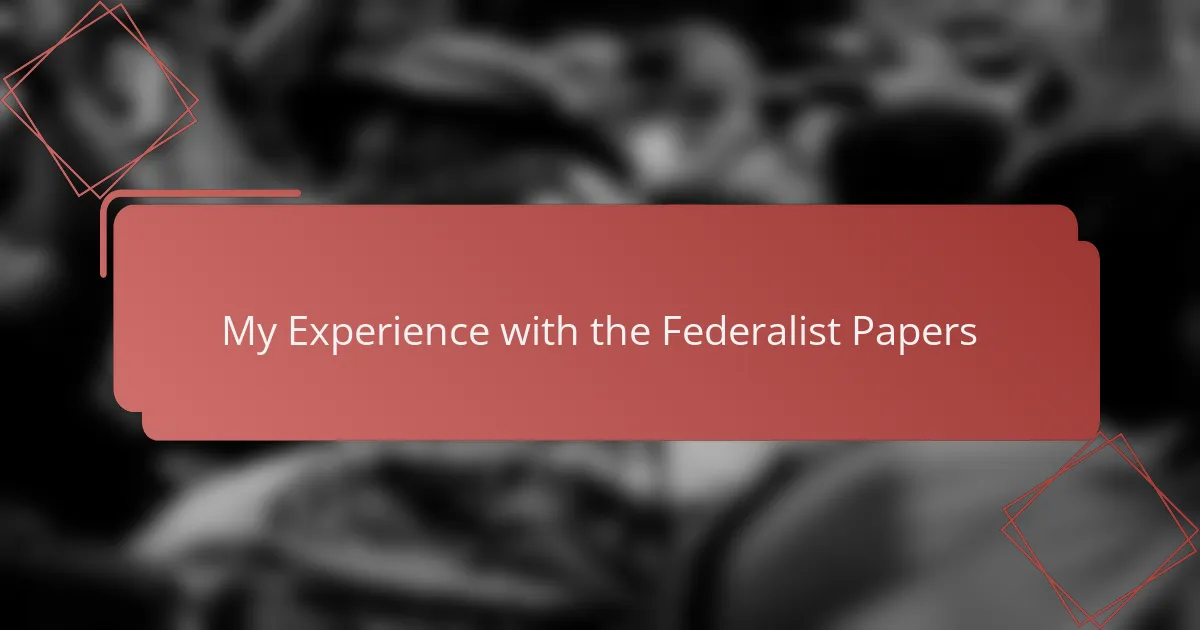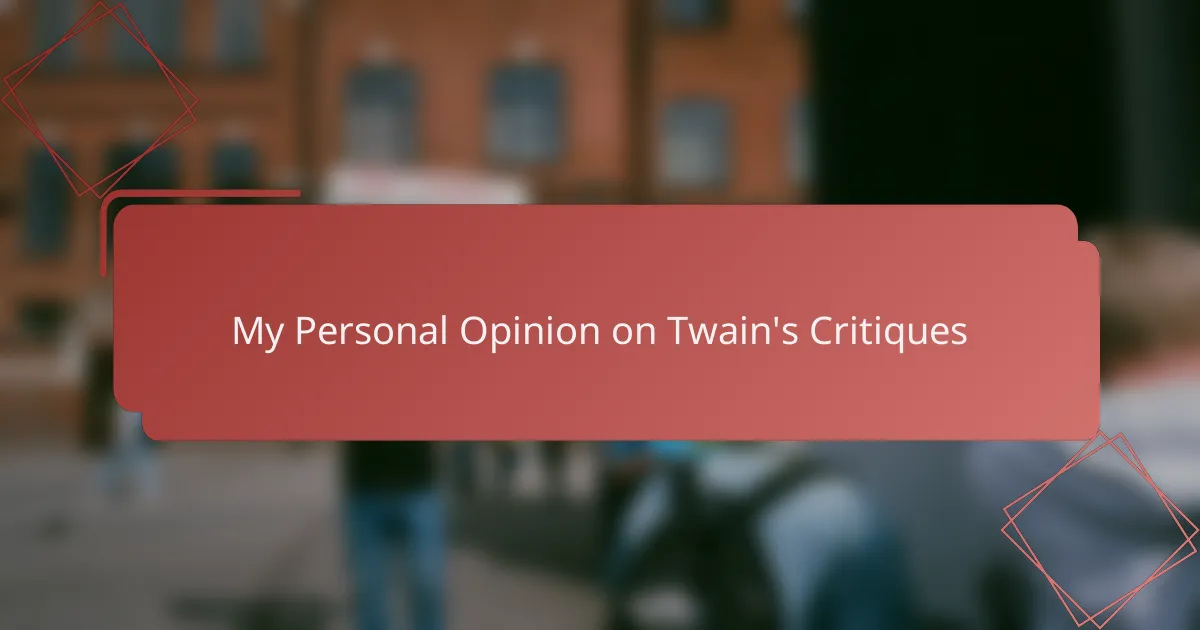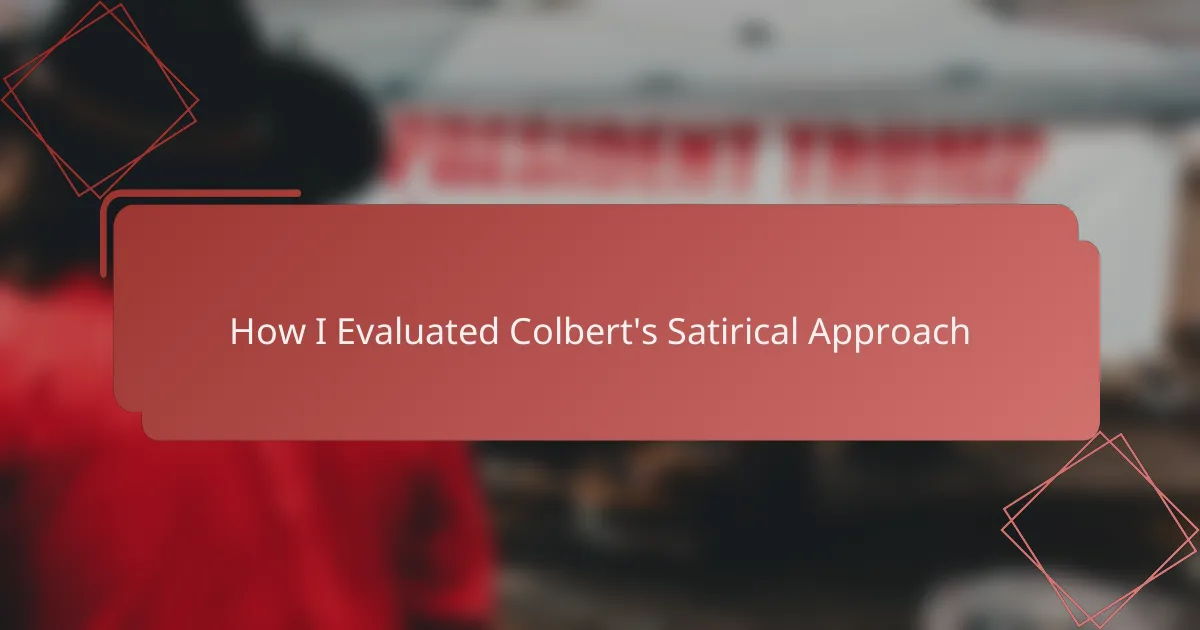Key takeaways
- Political satire effectively combines humor with critical commentary, encouraging audiences to think critically about political issues.
- Jon Stewart transformed political satire on “The Daily Show” by blending humor with serious analysis, inspiring media literacy and civic engagement.
- Satire has evolved from simple sketches to impactful commentary, shaping public discourse and promoting alternative perspectives.
- Stewart’s techniques, such as using irony and relatable language, made complex political issues accessible and fostered a sense of community among viewers.
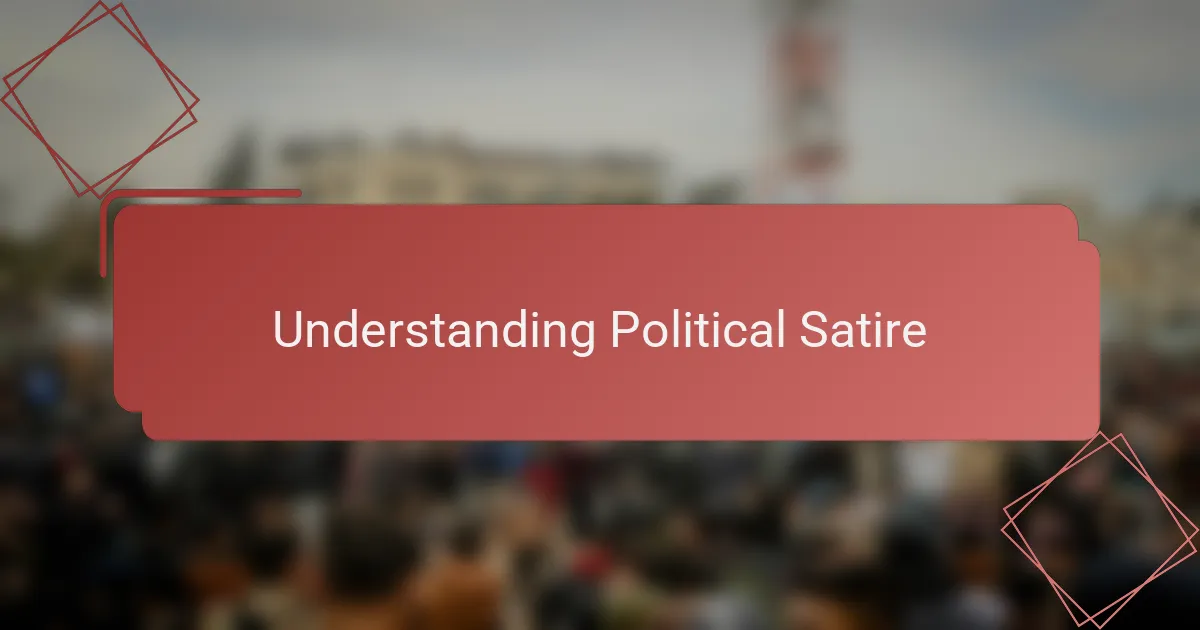
Understanding Political Satire
Political satire serves as a powerful tool to challenge authority and provoke thought by blending humor with critical commentary. From my experience watching countless episodes of satirical shows, I noticed how satire can distill complex political issues into digestible, often entertaining pieces that stay with you longer than standard news. It’s not just about making people laugh; it’s about making them think—and sometimes even act.
What strikes me most about political satire is its unique ability to hold a mirror up to society’s flaws without preaching. I remember watching Jon Stewart during politically turbulent times and feeling that mix of frustration and hope, as his sharp wit cut through the noise, helping me see things more clearly. Here’s what I believe are the key elements that make political satire so impactful:
- Uses humor to reveal the absurdity in political behavior and policies
- Engages audiences emotionally, making complex issues relatable
- Provides a platform for alternative perspectives outside mainstream media
- Encourages critical thinking by exposing contradictions and hypocrisy
- Balances entertainment and information to maintain audience interest
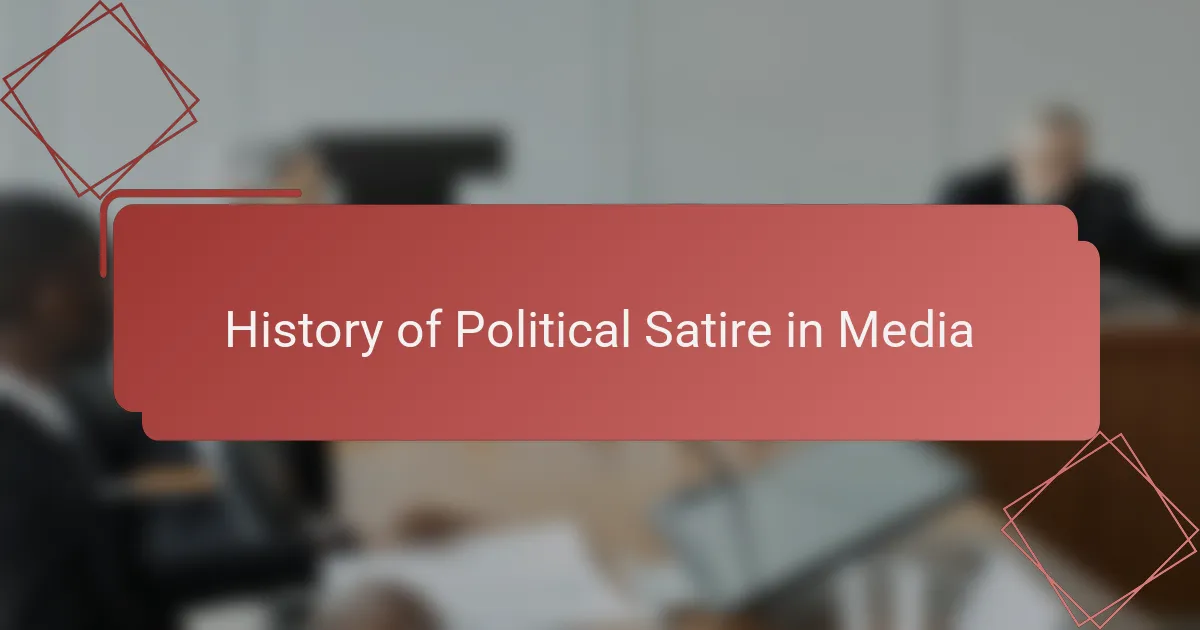
History of Political Satire in Media
Political satire has a long tradition of challenging authority and exposing societal flaws through humor. Looking back, I recall how shows like “Saturday Night Live” set early standards, but it was the rise of cable news satire in the late 20th century that truly transformed the landscape. It’s fascinating to see how humor evolved from simple sketches to incisive political commentary that shapes public discourse.
From my experience watching these changes unfold, I’ve noticed that political satire often acts as a mirror reflecting public sentiment while pushing boundaries. Here’s a quick rundown of key moments in the history of political satire in media:
- Early 1900s: Political cartoons in newspapers critique government policies and leaders.
- 1960s-1970s: Television comedy shows like “That Was The Week That Was” bring satire to mainstream audiences.
- 1980s-1990s: Programs such as “Saturday Night Live” and “The Daily Show” begin blending humor with real political news.
- Early 2000s: The Daily Show, under Jon Stewart, redefines satire by combining news analysis with sharp wit.
- Present day: The growth of digital platforms expands the reach and immediacy of political satire worldwide.
Through these shifts, I’ve found political satire to be more than entertainment—it’s a vital form of social commentary that appeals to our curiosity and critical thinking.
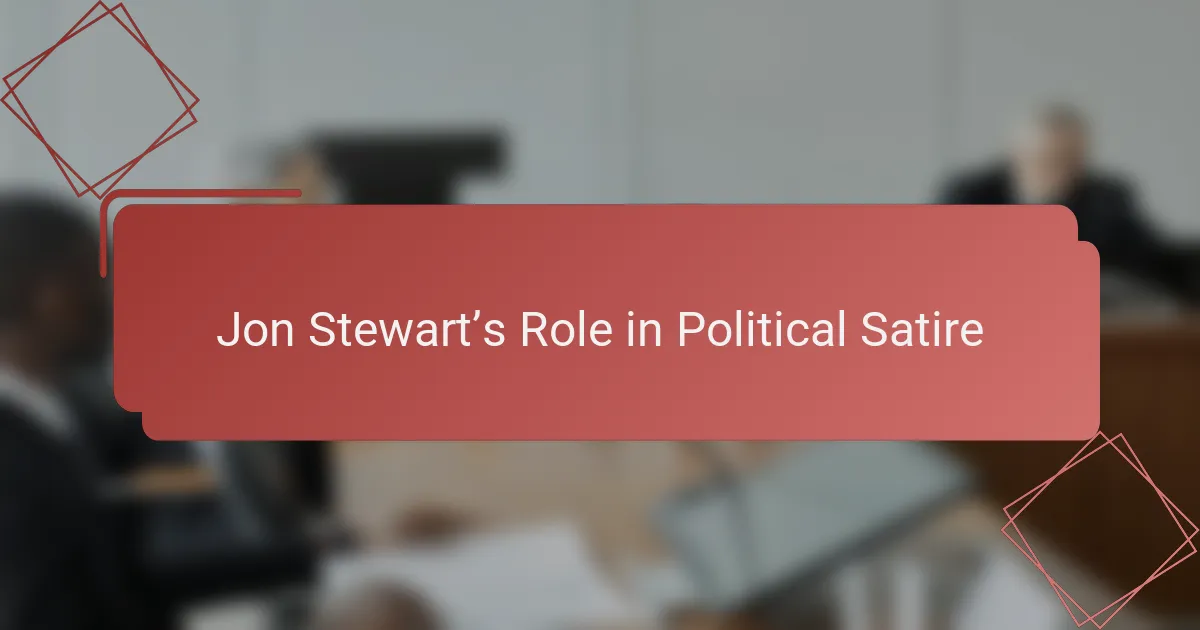
Jon Stewart’s Role in Political Satire
Jon Stewart redefined political satire by blending sharp humor with genuine concern for political issues. Watching him on “The Daily Show,” I often felt that his critiques went beyond mere comedy—they were a form of civic engagement that made complex topics more approachable and urgent. His ability to hold politicians accountable while making viewers laugh was nothing short of revolutionary.
What stood out to me was how Stewart used satire not just as entertainment but as a bridge to political awareness. I remember catching his take on various news scandals and realizing that his impact was as much about inspiring critical thinking as it was about humor. Here’s how I see his role in shaping political satire:
- Elevated satire to a respected platform for political commentary
- Blended sharp wit with thorough research, enhancing credibility
- Humanized political figures, exposing absurdities without losing nuance
- Encouraged viewers to question mainstream media narratives
- Inspired a new generation of satirists to engage with politics meaningfully

Techniques Used by Jon Stewart
One technique Jon Stewart mastered was using irony to highlight the contradictions inherent in political rhetoric. I often found myself chuckling, only to pause and think, “Wait, that actually makes a lot of sense.” This layering of humor with critical insight made his satire feel both witty and deeply relevant.
He also employed a conversational style that felt like he was talking directly to me, breaking down complicated political jargon into relatable, everyday language. That approach drew me in, creating a sense of trust and connection that many news programs lack.
What I truly admire is his timing—knowing exactly when to deliver a punchline and when to let a statement linger for impact. It’s as if he was guiding me through the chaos of information overload, helping me see the absurdity without feeling overwhelmed. Have you ever noticed how some jokes stick with you longer because they reveal a hard truth? That’s the power of Stewart’s technique.
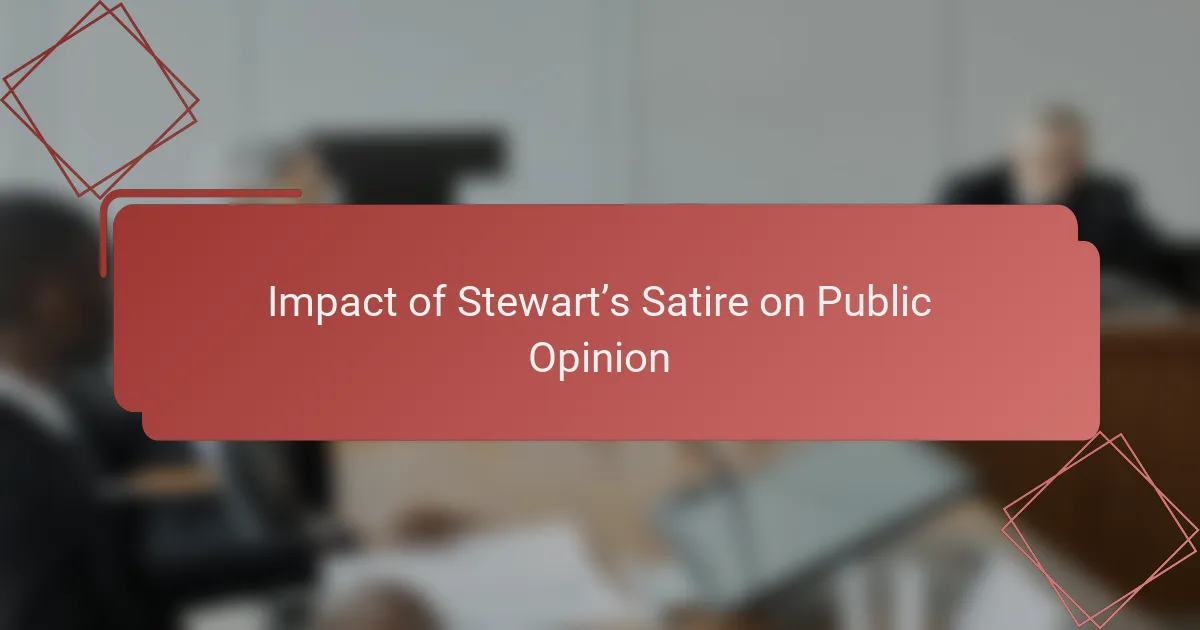
Impact of Stewart’s Satire on Public Opinion
Jon Stewart’s satire has always struck a chord with me because it blends humor with hard-hitting truths, making complex political issues accessible to a broad audience. His ability to challenge established narratives shifted how many people, including myself, perceive the news — turning skepticism into informed skepticism.
What stands out most about his influence is how his sharp wit changed public discourse and encouraged viewers to question authority without feeling overwhelmed. From my perspective, Stewart didn’t just entertain; he empowered everyday citizens to become more engaged and critical.
- Made political news more relatable and less intimidating
- Encouraged critical thinking over blind acceptance
- Highlighted hypocrisy and inconsistencies in politics with humor
- Fostered a sense of community among viewers who felt skeptical about mainstream media
- Inspired increased political participation and discussion among younger audiences
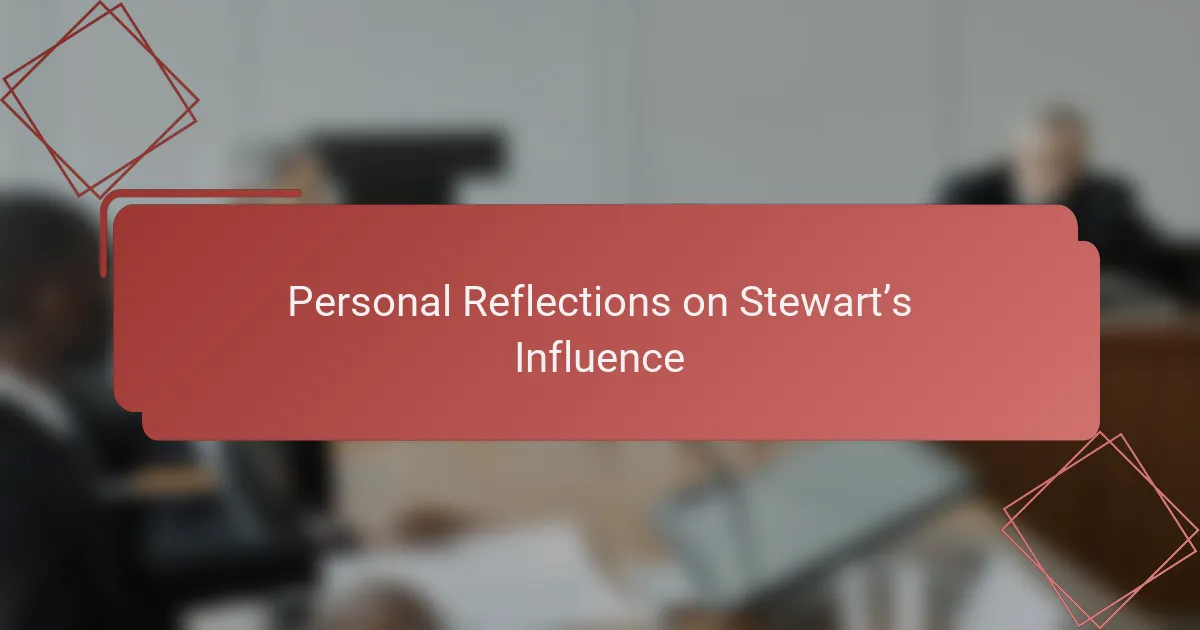
Personal Reflections on Stewart’s Influence
Jon Stewart’s impact on political satire has been deeply personal for me. Watching his shows during tense political times felt like having a trusted friend who could unpack complex issues with wit and clarity. His ability to blend humor with sharp critique not only informed me but also helped me cope with the overwhelming news cycles.
What stands out most is how Stewart made political discourse accessible and engaging without diluting its seriousness. He showed that satire could be a powerful tool for accountability and change, which inspired me to think more critically about media and politics.
- Made political satire approachable for a wide audience
- Balanced humor with meaningful critique
- Encouraged critical thinking about media and political narratives
- Fostered a sense of community among viewers through shared laughter and insight
- Inspired me personally to stay informed and engaged with current events

Applying Stewart’s Approach Today
Stewart’s knack for blending sharp wit with genuine empathy offers a blueprint for tackling today’s divided political climate. I’ve noticed that when I try to discuss contentious issues with friends, adopting his balanced skepticism helps keep the conversation open rather than confrontational. It’s more about questioning power structures than just mocking politicians.
Here’s how I think Stewart’s approach can be applied effectively now:
- Use humor to soften criticism while still delivering a hard truth.
- Prioritize facts but never lose sight of the humanity behind political debates.
- Encourage critical thinking without alienating people with opposing views.
- Highlight hypocrisy and absurdity in a way that invites reflection, not defensiveness.
- Balance satire with sincerity to foster genuine engagement and dialogue.

